|
|
|
Sort Order |
|
|
|
Items / Page
|
|
|
|
|
|
|
| Srl | Item |
| 1 |
ID:
100944
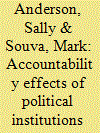

|
|
|
|
|
| Publication |
2010.
|
| Summary/Abstract |
Selectorate theory posits that leader accountability increases with the size of the winning coalition. Recent research contends that capitalism also increases leader accountability because leaders are more dependent on the public for revenue in more capitalist economies. The authors argue that extant tests of accountability arguments of interstate conflict initiation and targeting are flawed. Accountability theories of foreign policy expect leaders to selectively initiate disputes based on their probability of winning. Accountability arguments, then, expect a conditional relationship between the accountability mechanism and the balance of power. For example, if capitalism produces peace through accountability, then more capitalist states should be less likely to initiate militarized disputes as their power advantage decreases. The authors find that this is not the case. At the same time, the authors find robust support for selectorate theory's contention that larger winning coalitions are more selective about using military force. Political institutions induce accountability; capitalism does not.
|
|
|
|
|
|
|
|
|
|
|
|
|
|
|
|
| 2 |
ID:
144798
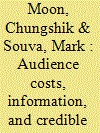

|
|
|
|
|
| Summary/Abstract |
Leaders who can accumulate audience costs can send costly signals that may help alleviate information problems associated with crisis escalation. We argue that research examining the effect of audience costs fails to appreciate the theoretical context in which audience costs matter. Audience costs may help alleviate information problems associated with international conflict. However, credible commitment problems are more central than information problems for some international conflicts. Theory does not expect audience costs to matter in this context; as a result, extant tests, and many criticisms, of the effect of audience costs on crisis escalation are flawed. We offer a more appropriate test of the effect of audience costs on crisis escalation. Consistent with extant theoretical arguments, we find that audience costs only reduce the likelihood of conflict when credible commitment problems are not the dominant concern motivating a dispute or crisis.
|
|
|
|
|
|
|
|
|
|
|
|
|
|
|
|
| 3 |
ID:
085439
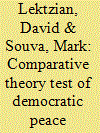

|
|
|
|
|
| Publication |
2009.
|
| Summary/Abstract |
Multiple theories posit the existence of a dyadic democratic peace. The authors extend the logic of three theories of the democratic peace - informational, normative, and preferences - and find that they make different predictions with respect to the onset and escalation of disputes across the range of similar regime dyads. First, regarding dispute onset, the preferences argument, but not the normative and informational arguments, expects autocratic dyads of similar type to have less conflict onset than mixed dyads.
|
|
|
|
|
|
|
|
|
|
|
|
|
|
|
|
| 4 |
ID:
118176
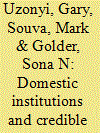

|
|
|
|
|
| Publication |
2012.
|
| Summary/Abstract |
Audience costs are a central feature of many prominent theories of international conflict. We advance the understanding of audience costs by specifying the domestic institutions necessary to generate them. In our conceptualization, audience cost capacity (ACC) is a function of the availability of alternative rulers and the cost of mobilizing against the incumbent. This conceptualization leads to the first measure of ACC that has variation between more and less democratic political systems and variation within autocracies. We subject our measure to a rigorous set of tests that includes addressing selection effects and temporal treatment effects, neither of which have been fully examined in this research area. The empirical analysis offers strong support for the validity of our measure.
|
|
|
|
|
|
|
|
|
|
|
|
|
|
|
|
| 5 |
ID:
159570


|
|
|
|
|
| Summary/Abstract |
Extant research has not produced consistent findings on the relationship between domestic political problems and the use of force abroad. We argue that this ambiguity results from incomplete theorizing and flawed empirical tests. We advance the understanding of diversionary uses of force by highlighting the political bias that domestic problems create for a leader and how this political bias interacts with the power relationship between diverters and potential targets. This conceptual discussion clarifies the political incentives each actor has to engage in military conflict and leads to a novel hypothesis. For example, domestic problems increase the probability that a weak state will attack a strong state, but domestic problems will have little effect on changing the probability of conflict between strong and weak. Empirical tests of the hypotheses for the period 1946–2000 are consistent with the argument.
|
|
|
|
|
|
|
|
|
|
|
|
|
|
|
|
| 6 |
ID:
120880


|
|
|
|
|
| Publication |
2013.
|
| Summary/Abstract |
Recent research has shown that the General Agreement on Tariffs and Trade (GATT)/World Trade Organization (WTO), contrary to common perceptions, does not increase trade. We argue that the effect of the GATT/WTO on dyadic trade flows is conditioned by the strength of market-protecting institutions (MPIs), which are the fundamental determinant of transaction costs. Dyads with weak MPIs do not see an increase in trade from GATT/WTO membership while dyads that have strong MPIs do see an increase in trade from GATT/WTO membership. In the former case, the benefits of GATT/WTO membership are outweighed by the high risk of doing business under weak market protection, but when property rights are well protected, GATT/WTO membership contributes positively to international trade. Empirical analysis of bilateral trade flows from 1948 to 1999 supports this hypothesis.
|
|
|
|
|
|
|
|
|
|
|
|
|
|
|
|
| 7 |
ID:
124986
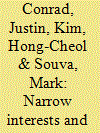

|
|
|
|
|
| Publication |
2013.
|
| Summary/Abstract |
Narrow interests and military resource allocation in autocratic regimes
Why do some autocratic states allocate more resources to the military than others? We contend that as narrow political interests have more influence on a leader, relative to broader political interests, a state's military burden increases. Further, we argue that two domestic factors are central to explaining the relative strength of narrow political interests for military spending, and therefore variation in state military burden. First, institutions that increase the cost of political participation reduce the influence of the median citizen, increasing the strength of narrow political interests and, concomitantly, military spending. Second, as a regime ages, narrow interests become more entrenched and the regime becomes less concerned about overthrow. In turn, older regimes spend more on their militaries. We test hypotheses from this argument by examining the military burden for all autocracies over the period 1950-2000. We find that variation in restrictions on political participation and the age of the regime are central to understanding differences in military spending among autocracies. Further, once these institutional features are taken into account, we find only modest support for the view that certain types of regimes spend more than others. What matters is not regime type but specific institutional features that affect the strength of narrow interests and vary across, and within, autocratic regimes.
|
|
|
|
|
|
|
|
|
|
|
|
|
|
|
|
| 8 |
ID:
101619
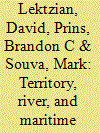

|
|
|
|
|
| Publication |
2010.
|
| Summary/Abstract |
Issues remain at the core of armed conflict. Territory, in particular, appears to increase substantially the probability of inter-state violence and is concluded by many to be one of the most critical correlates of war onset. While scholars have called for an issue-based approach to the study of international relations for some time, recent data collection efforts allow the emergence and management of contentious issues over time to be studied more directly. Our argument and evidence suggest that territory is not necessarily contentious by itself, but is contentious in dyadic contexts characterized by rivalry. Using data from the Issue Correlates of War project, which codes specific government assertions of ownership to territory, river, and maritime locations, we find strategic rivalry, coupled with territorial claims, produces some of the most conflict-prone dyads. Further, jointly democratic domestic institutions do not appear to reduce the hazard of violent conflict over territorial issues within the context of rivalry, although they substantially reduce the hazard of violent conflict among states outside the context of rivalry.
|
|
|
|
|
|
|
|
|
|
|
|
|
|
|
|
|
|
|
|
|